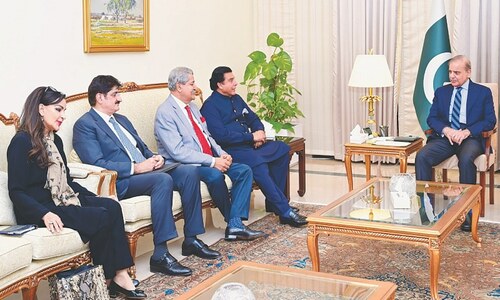ISLAMABAD, June 19: The International Monetary Fund (IMF) has granted a waiver to Pakistan’s non-fulfilment of performance targets by Wapda as it approved $123 million (SDR 86 million) tranche of the three-year $1.47 billion Poverty Reduction and Growth Facility (PRGF).
The executive board of the IMF on Wednesday completed the fifth review of Pakistan’s three year SDR 1.03 billion (about $1.47 billion) PRGF arrangement in Washington. With this disbursement, total releases so far under the facility would reach SDR 517 million ($738 million).
“In approving the disbursement, the Executive Board granted a waiver for Pakistan’s non-observance of a structural performance criterion regarding the preparation by April 15, 2003, of a revised Financial Improvement Plan (FIP) for the nation’s main power utility, the Water and Power Development Authority”, said an IMF announcement.
The major part of the IMF’s announcement is full of criticism on the performance of power utilities mainly their failure to reduce line losses to the agreed targets although it commended the government for its strong macroeconomic performance.
A slight delay in the privatization schedule has been attributed to regional security situation and a setback to energy sector reforms.
The IMF has shown dissatisfaction over line losses of the power utilities, non-payment of bills in certain areas, electricity tariffs that do not cover cost, and delays in implementing the unbundling of Wapda.
It has also stressed that vigorous efforts were needed to improve the performance of Wapda and KESC to limit their drain on the budget as well as free resources for priority social and development expenditures.
The IMF said the increase in better remuneration of civil servants in the budget 2003-04 should be part of a comprehensive civil service and pension system reform.
The planned privatization of Habib Bank Ltd and financial restructuring of insolvent banks, and the reform of the National Savings Schemes should improve the financial sector’s ability to support investment and growth, said the IMF announcement.
The IMF said: “The Fund commends the authorities for Pakistan’s strong macroeconomic performance, in the context of global economic weaknesses and a difficult regional security environment. All quantitative performance criteria for end- December 2002 were met.”
“Available data indicates that GDP growth remains strong, inflation low, and Central Board of Revenue (CBR) tax collections are in line with projections. The external current account and the overall balance of payments continue to overperform, with the value of the Pakistani rupee stable in US dollar terms,” it said.
The IMF said the poverty-related spending rose significantly during the first half of fiscal year 2002/03 as compared to the same period of 2001/02.
“Most structural reforms planned through April were broadly on track except for limited progress on privatization owing largely to regional security concerns that resulted in a lack of investor interest, and for setbacks in energy sector reforms,” the IMF deputy managing director said.
Further progress was made toward the completion of a full Poverty Reduction Strategy Paper and in strengthening the monitoring of intermediate social outcomes to ensure that higher human development expenditure translates into better public service delivery.
The IMF suggested continuation of broad-based structural reforms to create an investment conducive environment and further strengthening of sound economic foundations.
“Looking ahead, to strengthen further the foundation of higher sustainable growth and job creation the authorities need to persevere with the current macroeconomic policy mix, based on a flexible exchange rate, a monetary policy aimed at maintaining low inflation, and a fiscal policy aimed at further reducing the public debt burden while raising effective spending for human development”, the IMF said.
The submission to parliament of a draft budget for the next fiscal year that provides for a further reduction of the overall deficit while raising social and poverty-related expenditures is a significant step in that direction.
Macroeconomic policy will have to be supplemented by a broad range of structural reforms.














































Dear visitor, the comments section is undergoing an overhaul and will return soon.